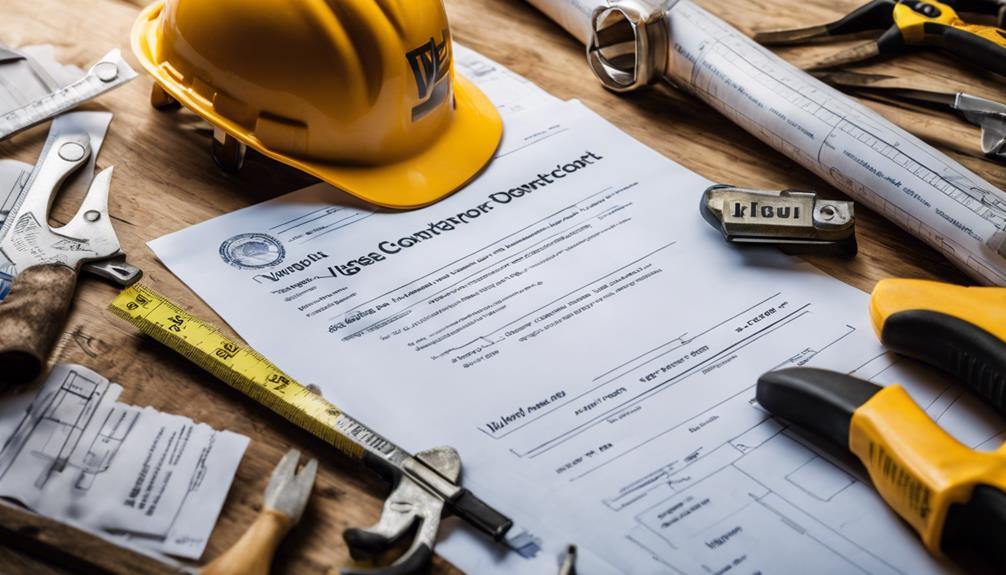When you're navigating the construction industry in Virginia, understanding the Contractor License Bond is essential for your success. This bond isn't just a formality; it plays a critical role in your business's credibility and your client's peace of mind. By securing this bond, you're not only adhering to local regulations but also setting yourself apart in a competitive market. However, you might wonder what specific benefits it offers and how it impacts your operations. Let's explore these aspects and see how they can influence your journey in the construction world.
What Is a Contractor License Bond?

A contractor license bond serves as a safeguard for both contractors and consumers in the construction industry. Essentially, it's a legally binding agreement that ensures contractors meet specific standards and follow regulations.
When you obtain this bond, you're not just fulfilling a requirement; you're showing your commitment to ethical practices and quality work. This type of bond is particularly important in states like Michigan, where Michigan Surety Bonds play a crucial role in protecting financial interests.
This bond acts as a financial guarantee for your clients. If you fail to complete a project, violate the terms of your contract, or engage in fraudulent activities, the bond provides a source of compensation for the affected parties. In such cases, the bonding company will step in to cover the costs, protecting consumers from potential losses.
For you, having a contractor license bond enhances your credibility and helps you stand out in a competitive market. It builds trust with clients, knowing that you're backed by a financial safety net.
Additionally, many states require this bond as part of the licensing process, meaning you'll need it to legally operate your business.
Importance of the Bond
Understanding the importance of a contractor license bond goes beyond just meeting regulatory requirements. This bond acts as a safety net for both you and your clients, ensuring compliance with local regulations and protecting public interest. When you have this bond in place, it demonstrates your commitment to professionalism and ethical practices.
Surety bond services overview highlights the benefits of having a bond, which can enhance your reputation and lead to more business opportunities.
Clients often seek contractors who carry a bond, as it reassures them that you're financially responsible. If you fail to complete a job or don't meet the agreed-upon standards, your clients can file a claim against the bond. This means they've a way to recover losses, which can enhance your reputation and lead to more business opportunities.
Additionally, having a contractor license bond can help you stand out in a competitive market. It signals to potential clients that you're serious about your trade and willing to invest in your business.
Types of Contractor License Bonds

Several types of contractor license bonds exist, each tailored to meet specific needs and requirements in Virginia. Understanding the different categories can help you select the right bond for your business.
In Illinois, for instance, contractors often rely on Illinois Surety Bonds to ensure compliance with legal obligations and protect against financial losses. The most common type is the general contractor license bond, which is often required for those working in construction or renovation. This bond ensures that you'll adhere to local laws and regulations while protecting clients from potential financial losses.
Another type is the specialty contractor bond, which is specific to certain trades such as plumbing, electrical, or HVAC work. This bond guarantees compliance with industry standards and provides peace of mind to your clients.
Additionally, there's the performance bond, which guarantees that you'll complete a project according to the agreed-upon terms. It protects project owners from financial loss if you fail to fulfill your contract.
Lastly, the payment bond secures that subcontractors and suppliers get paid for their work. This is crucial in maintaining good relationships and ensuring smooth project execution.
Eligibility Requirements
Meeting eligibility requirements for a contractor license bond is crucial to ensuring your business can operate legally in Virginia. To qualify, you must hold an active contractor license issued by the Virginia Department of Professional and Occupational Regulation (DPOR). This means you need to meet specific education and experience criteria, which vary depending on the type of contractor license you're applying for.
Additionally, you'll need to provide proof of financial stability. This often involves demonstrating a minimum credit score and providing financial statements. In some cases, you might also have to show that you've not had any recent bankruptcies or significant debt issues.
Another key requirement is that you mustn't have any felony convictions related to your professional conduct. This is to ensure that only qualified individuals are eligible for licensing and bonding.
Application Process

The application process for a Virginia contractor license bond can seem daunting, but it's straightforward if you follow the steps carefully.
First, gather all necessary documents, including your contractor license application, proof of insurance, and any required financial statements. Make sure everything is up-to-date and accurately reflects your business.
Next, you'll need to choose a surety company. Take your time to research different companies and their reputations. Once you've selected one, reach out to them to initiate the application. They'll likely ask for details about your business and your financial history, so be prepared to provide that information.
After submitting your application, the surety company will evaluate your creditworthiness and business background. This step usually involves a review of your financial stability and experience in the industry.
If everything looks good, you'll receive a quote for your bond.
Cost of the Bond
Once you receive a quote for your bond, understanding the cost is vital for budgeting your project. The price of a Virginia contractor license bond typically ranges between 1% to 5% of the total bond amount. For instance, if you need a $50,000 bond, you might pay anywhere from $500 to $2,500 annually. Your exact rate depends on various factors, including your credit score, experience, and the specific bonding company you choose.
Insurers assess your financial stability and business history to determine your risk level, which directly impacts your premium. A higher credit score often means a lower premium, while a lower score could lead to higher rates. Additionally, the nature of your contracting work may influence the bond cost; riskier projects typically carry higher premiums.
It's essential to shop around and compare quotes from different bonding companies to find the best deal. Some may offer discounts or flexible payment plans that fit your budget.
Ultimately, understanding these costs will help you allocate funds appropriately, ensuring your project runs smoothly without unexpected financial burdens.
Duration and Renewal

Understanding the duration and renewal process of your Virginia contractor license bond is crucial for maintaining compliance. Typically, your bond will be valid for one year from the date of issuance.
It's important to keep track of this timeline to avoid any lapses in coverage. If your bond expires, you could face fines or even loss of your contractor's license.
Renewing your bond is a straightforward process. You'll need to contact your surety company before the expiration date to initiate the renewal. They may require you to provide updated information or documentation.
Generally, your premium may vary upon renewal based on your claims history or changes in your financial situation.
Once you've completed the renewal process, ensure that your new bond is filed with the appropriate Virginia licensing authority. This step is essential to maintain the legitimacy of your contractor license.
Always keep a copy of your renewed bond for your records.
Common Claims Against Bonds
Familiarity with common claims against contractor license bonds can save you from unexpected headaches. One of the most frequent claims arises from non-payment of subcontractors or suppliers. If you fail to pay them for their services or materials, they might file a claim against your bond to recover their losses.
Another common issue is violation of local building codes or regulations. If you don't adhere to these rules, clients or authorities may file a claim against your bond, seeking compensation for damages or penalties incurred.
Additionally, poor workmanship can lead to claims. If a client feels that your work doesn't meet the agreed standards, they can pursue a claim against your bond to cover repair costs.
Furthermore, consumer complaints can also trigger claims. If a client feels scammed or misled, they may take legal action, resulting in a bond claim.
It's essential to understand these potential pitfalls and take proactive measures. Regular communication with clients, adhering to contracts, and maintaining high-quality work are vital in preventing claims against your bond.
Being aware of these common claims can protect your business and maintain your reputation in the industry.
Benefits for Contractors

A contractor license bond offers significant benefits that can enhance your business operations and reputation. First, it serves as a testament to your professionalism and reliability. When clients see that you're bonded, they'll feel more secure in hiring you, knowing there's a financial safety net in place if things go wrong.
Additionally, having a license bond can help you stand out in a competitive market. It shows potential customers that you take your responsibilities seriously and are committed to adhering to industry standards. This can lead to more job opportunities and referrals, boosting your bottom line.
Moreover, a contractor license bond protects you from possible financial losses due to claims against your work. If a client files a complaint, the bond can cover the costs, allowing you to focus on resolving the issue without jeopardizing your finances.
Resources and Support
Having access to reliable resources and support can make a significant difference in your contracting business. You'll want to tap into various organizations that offer guidance and assistance tailored to contractors like you. The Virginia Department of Professional and Occupational Regulation (DPOR) is a great starting point. They provide essential information on licensing, regulations, and compliance, ensuring you stay informed and up-to-date.
In addition, consider joining local contractor associations. These groups often host networking events, workshops, and seminars that can help you connect with other professionals and gain valuable insights. Plus, they can provide advocacy and representation on issues affecting your industry.
Don't overlook online resources, either. Websites like the Small Business Administration (SBA) offer tools and advice on everything from financing to marketing strategies. You can also find forums and social media groups where you can ask questions and share experiences with fellow contractors.
Lastly, consider hiring a mentor or consultant with industry experience. They can offer personalized advice and help you navigate complex challenges.
With these resources and support systems, you'll be better equipped to grow and succeed in your contracting business.
Conclusion
In summary, securing a Virginia Contractor License Bond is essential for your success in the construction industry. It not only protects your clients but also enhances your credibility and professionalism. By understanding the bond's importance, types, and application process, you can position yourself as a trustworthy contractor. Remember, having this bond sets you apart from the competition and opens up more opportunities for your business. Don't underestimate the value it brings to your career!


